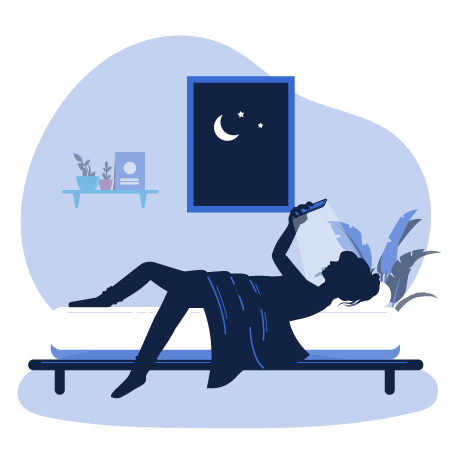Why Teens Need More Sleep, and How We Can Help Them Get It
 We already know this pandemic has been horrendous for teens and their mental health. But there is another piece that plays an important factor in teen mental health, especially now: sleep and its role in boosting mental health and emotional resiliency.
We already know this pandemic has been horrendous for teens and their mental health. But there is another piece that plays an important factor in teen mental health, especially now: sleep and its role in boosting mental health and emotional resiliency.
With children and teens readjusting to the world in the wake of pandemic isolation, sleeping well can be a protective factor, says Lisa Meltzer, a pediatric psychologist at National Jewish Health in Denver.
From a mental health standpoint, aiming for more than just the minimum eight hours can be most helpful, experts have found. In one study, teens who got 8¾ to nine hours of sleep per night had the lowest levels of mental health issues, including moodiness, feelings of worthlessness, anxiety and depression.
In a recently published study examining college students’ sleep and mood, Tim Bono, a lecturer in psychological and brain sciences at Washington University in St. Louis, found that the students who got the most weeknight sleep on a regular basis also posted the biggest increases in happiness and well-being over the course of the semester. This was true even for students who had lower baseline happiness levels at the start of the study.
When teens aren’t getting enough sleep during the week, they often sleep in late on the weekends to make up for the shortfall, which perpetuates the cycle.
Getting enough sleep can provide an emotional buffer to help teens handle daily stressors, research shows.
Meltzer characterizes the relationship between sleep and mental health as “intricately interwoven”: Sleep loss can have a negative effect on mood and emotional resiliency, and mental health issues can affect sleep.
“We know that, for different mental health diagnoses, anxiety and depression in particular, sleep can be both a symptom and a negative outcome of the disorder,” she says. “If we can improve the sleep, some of the mental health symptoms will improve. But just treating the sleep issue isn’t going to necessarily cure depression or anxiety.”
Instead, she recommends that both sides of the equation — the sleep issues and the mental health issues — be addressed concurrently. (She also notes that teens regularly sleeping too much — more than 10 hours every night — may be a sign of them being depressed.)
Meltzer stresses the importance of sleep consistency for teens, along with good sleep habits and best practices upon waking. “Being exposed to bright light and getting out of bed in the morning are really critical,” she says. “For circadian rhythm regulation, it’s really important to have darkness in the evening and bright light in the morning.”
She also recommends that teens don’t linger in bed, particularly if they’re spending that time ruminating or using electronic devices.
“When we’re talking about sleep and mental health, those are the three takeaways: one, a consistent schedule; two, bright light in the morning; and three, only being in bed when they’re sleeping,” Meltzer says.
Other suggestions to help promote better sleep among teens include:
Moderate caffeine intake: Caffeine is consumed by about 80 percent of teens and is a quick and effective pick-me-up, but caffeine in the afternoon or evening can make it harder to fall asleep that night.
Be strategic about napping: Teens who nap too late in the day and/or nap too long can end up in a bad cycle.
Exercise: Moderate to vigorous physical activity, such as walking, running or playing basketball, can help set the stage for better sleep that night. Again, timing matters: Late-night exercising may cause teens to feel more alert.
Excerpted from “Why Teens Need More Sleep, and How We Can Help Them Get It” in The Washington Post. Read the full article online for additional details.
Source: The Washington Post | Why Teens Need More Sleep, and How We Can Help Them Get It, https://www.washingtonpost.com/parenting/2022/01/18/kids-teens-more-sleep | © 2022 The Washington Post
If you have concerns about your child or teen, CHC Care Coordinators can arrange a free 30-minute consultation so you can explore options with an expert. We invite you to call or email us at 650.688.3625 or careteam@chconline.org to set up an initial Parent Consultation appointment. CHC teletherapy services are available now.





